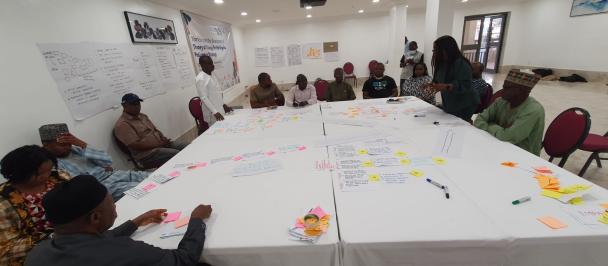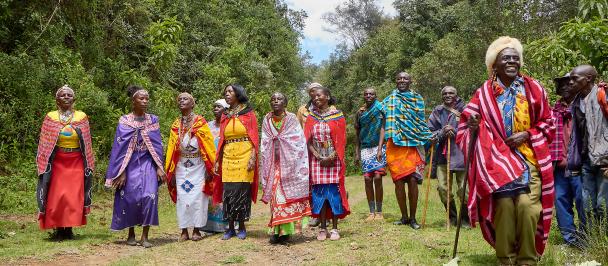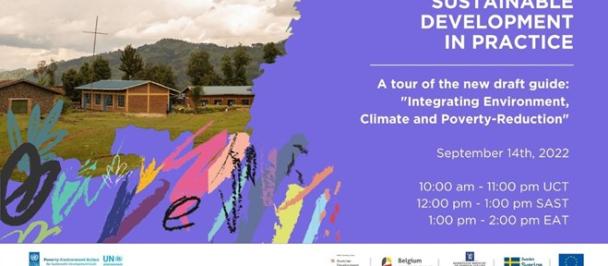Photo: UNDP
Around the world, nature’s rapid decline needs to be met with urgent and coordinated action across all levels. Yet while evidence on the importance of protecting and promoting biodiversity and ecosystem services has significantly grown in the past decades, policy measures and on-the-ground actions by practitioners are often missing from the equation. The Biodiversity and Ecosystem Services Network's (BES-Net) Phase II aims to redress this through the BES Solution Fund.
The BES Solution Fund is a catalytic seed fund provided to selected countries to implement tangible and scalable biodiversity solutions. The country activities are carried out in an evidence-based manner, building on the key messages of the thematic assessments of the Intergovernmental Science-Policy Platform on Biodiversity and Ecosystem Services (IPBES) and/or the country’s national ecosystem assesment. With the support of the International Climate Initiative (IKI) of the German Federal Ministry for the Environment, Nature Conservation and Nuclear Safety (BMU), the Fund will run up to 2028, and a total of 18 countries will benefit from the initiative, receiving about US$ 350,000 each.
Following the launch in January 2021, the first phase of the Fund was awarded to a total of 7 countries. Among them, Kazakhstan, Kenya, Nigeria and Trinidad and Tobago participated in the BES-Net Regional Trialogues over the course of 2018 and 2019. Since then, these countries have already formed policy-science-practice networks and initiated some voluntary and innovative actions proactively to promote the uptake of the IPBES thematic assessments. The BES Solution Fund is expected to support the countries in accelerating and upscaling their ongoing efforts to conserve pollinators, rehabilitate degraded land and strengthen the platforms among the BES-focused policymakers, scientists and practitioners.
Meanwhile, Cameroon, Colombia and Viet Nam have been in the process of finalizing and launching their national ecosystem assessments and identifying policy and other actions to be undertaken based on the assessment findings. The BES Solution Fund will be utilized to help the country governments and their partners take up some of the priority policy and on-the ground action points.
Speaking about the Fund, Yuko Kurauchi, Policy Specialist of the UNDP Global Policy Centre on Resilient Ecosystems and Desertification and Project Coordinator of BES-Net, said, “The BES Solution Fund is truly an opportunity to connect national biodiversity strategies and local grassroots actions to the best available evidence underpinned by scientific, indigenous and local knowledge systems for nature. Making these connections across levels is critical. From pollinator-friendly agriculture to food security to payment for ecosystem services and many more, there is a wealth of innovative ideas and experiences that we have learnt from the IPBES assessments and the national assessments. The Fund will contribute to enhancing dialogues and interactions among policy, science and practice sectors and stepping up their joint commitments to the post-2020 biodiversity targets and the Sustainable Development Goals.”
There has also been positive response from the countries currently implementing activities under the BES Solution Fund. “Kudos to BES-Net for supporting capacity building of stakeholders on pollinators in Nigeria. Their support is helping to conserve pollinator species in Nigeria”, stated the Honourable Minister of State for the Environment, H.E. Sharon Ikeazor of Nigeria at the 2021 World Bee Day Art Exhibition organized in Abuja under the i BES Solution Fund.
Hon. Yerlan Nissanbayev, the Vice-Minister of Ecology, Geology and Natural Resources in Kazakhstan said, “So far, the BES-Net Trialogue has echoed the integral aspect of spatial planning and policy, which brings multiple benefits relative to national development objectives. Central Asian countries share common land degradation and desertification challenges, as illustrated by the deteriorating quality and productivity of cropland and forestland. The cross-border nature of the issue underscores the need to strengthen coordination efforts across states boundaries for sustainable land management and biodiversity conservation at regional, national and local levels.”
BES-Net envisions a series of knowledge exchange and capacity development workshops to promote peer to peer learning and exchange of knowledge and experiences among the BES Solution Fund recipient countries. The first of these workshops will be held on 26 October 2021, engaging participants from Kazakhstan, Kenya, Nigeria and Trinidad and Tobago. This initial workshop will set the tone for future activities aiming to initiate a Community of Practice (CoP) among the countries beneficiaries of the BES Solution Fund to promote knowledge sharing, networking and exchange collaborative opportunities and challenges in implementing the Fund.
The full story is accessible at the BES-Net website.

 Locations
Locations



